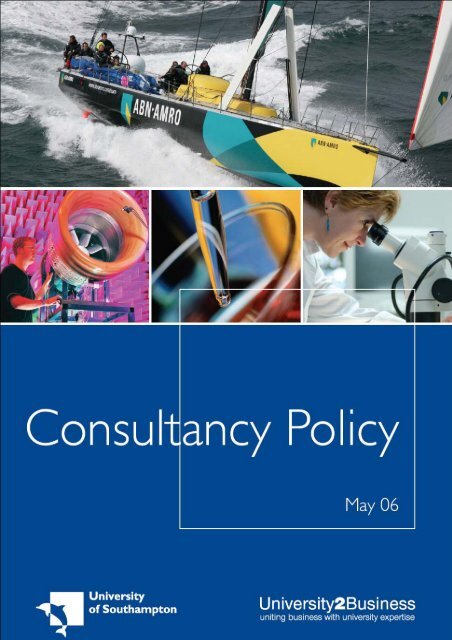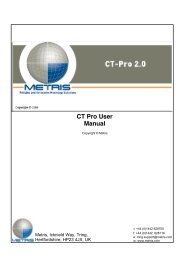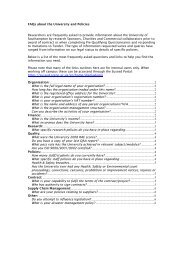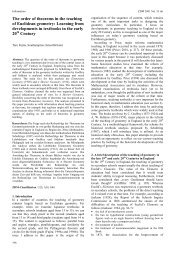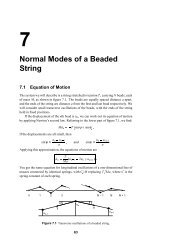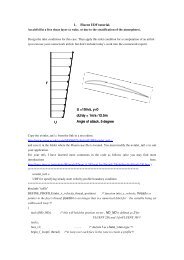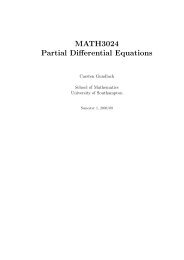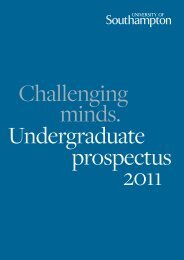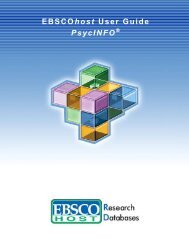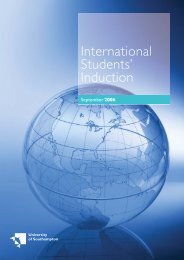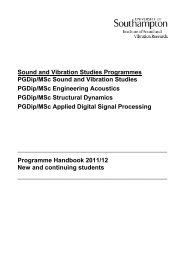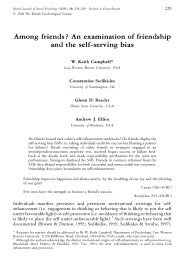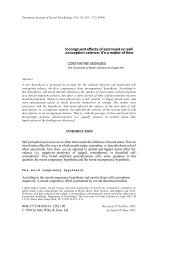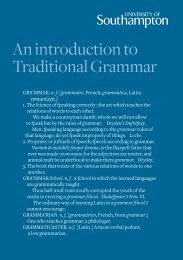Full guide to Consultancy Policy May 2006 Page 1 - University of ...
Full guide to Consultancy Policy May 2006 Page 1 - University of ...
Full guide to Consultancy Policy May 2006 Page 1 - University of ...
You also want an ePaper? Increase the reach of your titles
YUMPU automatically turns print PDFs into web optimized ePapers that Google loves.
<strong>Full</strong> <strong>guide</strong> <strong>to</strong> <strong>Consultancy</strong> <strong>Policy</strong> <strong>May</strong> <strong>2006</strong> <strong>Page</strong> 1
CONSULTANCY POLICY<br />
AT THE<br />
UNIVERSITY OF SOUTHAMPTON<br />
PRC Approved version – Mar06<br />
Version 1.3<br />
Issued on behalf <strong>of</strong> the Enterprise and Innovation <strong>Policy</strong> Committee<br />
<strong>Full</strong> <strong>guide</strong> <strong>to</strong> <strong>Consultancy</strong> <strong>Policy</strong> <strong>May</strong> <strong>2006</strong> <strong>Page</strong> 2
CONTENTS<br />
section<br />
FOREWORD BY THE VICE CHANCELLOR 3<br />
EXECUTIVE SUMMARY 4<br />
1.0 INTRODUCTION 6<br />
1.1 Document layout and conventions<br />
1.2 Principles<br />
2.0 OVERALL POLICY 8<br />
2.1 Types <strong>of</strong> consulting channels<br />
2.2 Consulting Channel – which is appropriate?<br />
2.3 Eligibility <strong>to</strong> consult – background<br />
2.4 Eligibility <strong>to</strong> consult – job categories<br />
2.5 Consent from Head <strong>of</strong> School<br />
2.6 Reward and remuneration<br />
2.7 Related policies and evolution<br />
2.8 One-page <strong>Consultancy</strong> <strong>Policy</strong> Summary (tables) 11<br />
3.0 PRIVATE CONSULTING POLICY 12<br />
3.1 Introduction and outline<br />
3.2 Consent and eligibility<br />
3.3 Commercial<br />
3.4 Additional notes <strong>of</strong> guidance<br />
4.0 SCHOOL-BASED CONSULTING POLICY 15<br />
4.1 Introduction and outline<br />
4.2 Consent and eligibility<br />
4.3 Commercial<br />
4.4 Financial and remuneration<br />
5.0 UNIT-BASED CONSULTING POLICY 16<br />
5.1 Introduction and outline<br />
5.2 Consent and eligibility<br />
5.3 Commercial<br />
5.4 Financial and Remuneration<br />
6.0 SERVICE COMPANY-BASED CONSULTING POLICY 17<br />
6.1 Introduction and outline<br />
6.2 Eligibility and consent<br />
6.3 Commercial<br />
6.4 Financial and remuneration<br />
APPENDICIES<br />
APPENDIX I – HEAD OF SCHOOL/DIRECTOR OF PROFESSIONAL SERVICES<br />
CONSENT<br />
APPENDIX II – DISCALIMER FOR PRIVATE CONSULTING 22<br />
APPENDIX III – CONSULTING CHANNEL OPTIONS (SCHEMATIC) 23<br />
APPENDIX IV – INTERIM DEVELOPMENT NOTES 24<br />
page<br />
19<br />
<strong>Full</strong> <strong>guide</strong> <strong>to</strong> <strong>Consultancy</strong> <strong>Policy</strong> <strong>May</strong> <strong>2006</strong> <strong>Page</strong> 3
FOREWORD BY THE VICE CHANCELLOR<br />
Enterprise at the <strong>University</strong> <strong>of</strong> Southamp<strong>to</strong>n:<br />
<strong>Consultancy</strong> fits within our enterprise agenda which has developed <strong>to</strong> a point where the <strong>University</strong> <strong>of</strong> Southamp<strong>to</strong>n is<br />
seen as being in the vanguard in many areas <strong>of</strong> enterprise activity.<br />
Why should we engage with the enterprise agenda?<br />
The answer is not simply financial but relates <strong>to</strong> our aspirations as an institution. In that sense enterprise is not in<br />
conflict with our activities in research and education but is supportive <strong>of</strong> those activities. The degree <strong>of</strong> enthusiasm for<br />
enterprise will be dependent on discipline, stage in career, personal goals etc. Nevertheless, here are the ten reasons<br />
why collectively and as an institution we would wish <strong>to</strong> engage with the enterprise agenda.<br />
A major , distinctive and well-resourced <strong>University</strong>.<br />
• Support aspiration <strong>to</strong> be a world-leading <strong>University</strong> (thought leadership and cross<br />
disciplinary programmes are characteristics <strong>of</strong> such Universities e.g., Stanford, MIT).<br />
• Differentiate <strong>University</strong> in a crowded higher education marketplace by becoming a<br />
recognised regional/national leader <strong>of</strong> the Enterprise Agenda, thus enhancing its visibility<br />
and reputation<br />
• Income generation for staff, Schools and <strong>University</strong>.<br />
• Build closer links with the commercial world, notably industry (leading <strong>to</strong> greater<br />
opportunities for contract research, consultancy and sponsorship).<br />
High quality staff and students in an environment o f opportunity.<br />
• Support staff recruitment (attraction <strong>of</strong> entrepreneurial culture & potential <strong>to</strong> engage in enterprise<br />
activity).<br />
• Support staff retention (increase rewards <strong>to</strong> staff & strengthen links between entrepreneurial staff and<br />
locality).<br />
• Support student recruitment (attraction <strong>of</strong> entrepreneurial culture & ability <strong>to</strong> gain entrepreneurial<br />
skills and increase employability).<br />
• Provision <strong>of</strong> additional facilities and opportunities for staff and students through both spin-out and<br />
spin-in activities.<br />
Making a national contribution.<br />
• Strengthen links between the <strong>University</strong> and the wider economy (lead the enterprise agenda in SE<br />
region).<br />
• Economic benefits <strong>to</strong> the nation (knowledge economy) that align with Government agenda for higher<br />
education.<br />
Consulting supports many <strong>of</strong> the above aims. The <strong>University</strong> seeks <strong>to</strong> encourage high value/high quality consulting<br />
activities as an important contribution <strong>to</strong> the enterprise agenda.<br />
<strong>Full</strong> <strong>guide</strong> <strong>to</strong> <strong>Consultancy</strong> <strong>Policy</strong> <strong>May</strong> <strong>2006</strong> <strong>Page</strong> 4
EXECUTIVE SUMMARY<br />
Source <strong>of</strong> reference<br />
<strong>Consultancy</strong> forms an important part <strong>of</strong> the Enterprise agenda and this policy provides a single source <strong>of</strong> reference.<br />
This summary provides an outline. Please refer <strong>to</strong> the core policy for concise policy description.<br />
Consulting Channels<br />
The policy sets out the four channels through which consulting may be conducted namely:<br />
• Private consulting – where a member <strong>of</strong> staff consults on their own without the involvement <strong>of</strong> the <strong>University</strong><br />
and where revenue flows directly <strong>to</strong> the academic.<br />
… and three <strong>University</strong>-based channels:<br />
• School-based consulting/services rendered – where a member <strong>of</strong> staff consults in co-operation with the<br />
School.<br />
• Unit-based consulting – where there is an existing Industrial or Consulting Unit through which the consultancy<br />
activity is managed.<br />
• Service company-based consulting – which is new and intended <strong>to</strong> help promote new and untapped areas <strong>of</strong><br />
expertise. This is an approach delivered through the <strong>University</strong> <strong>of</strong> Southamp<strong>to</strong>n Consulting Ltd (UoSC). This<br />
is a wholly owned subsidiary <strong>of</strong> UoS Holdings Ltd.<br />
The value <strong>of</strong> established consulting through both private and university-based channels is recognised as a valuable<br />
contribution <strong>to</strong> the standing <strong>of</strong> the <strong>University</strong>.<br />
Balance<br />
This policy seeks <strong>to</strong> strike a practical balance between prescriptive policy and guidance, and the freedom <strong>of</strong> Heads <strong>of</strong><br />
School <strong>to</strong> exercise judgement on what is appropriate for their particular school circumstances.<br />
The scope <strong>of</strong> consulting<br />
Consulting is defined as part <strong>of</strong> knowledge transfer, and arises where knowledge and expertise can be deployed<br />
successfully for financial and other forms <strong>of</strong> benefit. This may include a range <strong>of</strong> consulting activities such as the<br />
delivery <strong>of</strong> non-award bearing CPD. Consulting does not include:<br />
• The creation <strong>of</strong> knowledge (i.e. research) – activities operated under the heading <strong>of</strong> consultancy cannot<br />
normally qualify for RAE<br />
• The dissemination <strong>of</strong> primary knowledge (i.e. education) – core teaching or teaching related activities in<br />
relation <strong>to</strong> any award bearing programme.<br />
Consent<br />
All consulting activity through all channels must be reviewed and receive prior consent from the appropriate Head <strong>of</strong><br />
School or Direc<strong>to</strong>r <strong>of</strong> Pr<strong>of</strong>essional Services <strong>to</strong> observe policy requirements on aspects such as:<br />
• Eligibility (this varies according <strong>to</strong> staff category)<br />
• Consulting channel (different commercial rules apply)<br />
• Risk (<strong>to</strong> safeguard <strong>University</strong> and staff interests)<br />
This policy draws a distinction between those members <strong>of</strong> staff who:<br />
• <strong>May</strong> consult directly and contract with a client <strong>to</strong> do consultancy work through eligible channels and,<br />
• Those who may assist in consultancy activities but may not agree contracts with clients.<br />
<strong>Full</strong> <strong>guide</strong> <strong>to</strong> <strong>Consultancy</strong> <strong>Policy</strong> <strong>May</strong> <strong>2006</strong> <strong>Page</strong> 5
Eligibility<br />
The policy governing the eligibility <strong>to</strong> consult has been revised and extended. In summary for Staff in the Education,<br />
Research and Enterprise (ERE) job family:<br />
• Academic staff may engage in consultancy under the so-called 30-day rule through any <strong>of</strong> the four valid<br />
channels<br />
• Research and teaching staff may also consult under the so-called 30-day rule subject <strong>to</strong> some additional<br />
criteria, and<br />
• Enterprise staff (including those employed in industrial or advisory units) may <strong>of</strong> course engage in consulting<br />
if they have been employed in consulting roles, this is part <strong>of</strong> their normal duties. Normally they may only do<br />
so through the Unit-based consulting channel <strong>of</strong> the unit <strong>to</strong> which they belong.<br />
Outside the ERE family, staff at level 4 or above may, with advance permission use up <strong>to</strong> 15 days <strong>of</strong> their paid annual<br />
leave for external private consultancy. Staff at or below level 3 may assist.<br />
Related Policies and Evolution<br />
This policy co-exists with other relevant policies including those covering conflict <strong>of</strong> interest and full economic costing<br />
<strong>to</strong> which you are referred.<br />
Against a background <strong>of</strong> changing priorities, opportunities and risks, the <strong>University</strong> will keep this policy under review<br />
via the Enterprise and Innovation <strong>Policy</strong> Committee in order <strong>to</strong> maintain and promote:<br />
• The best interest <strong>of</strong> staff and the <strong>University</strong>,<br />
• Appropriate management <strong>of</strong> risks and,<br />
• Clear and appropriate governance and eligibility rules.<br />
<strong>Full</strong> <strong>guide</strong> <strong>to</strong> <strong>Consultancy</strong> <strong>Policy</strong> <strong>May</strong> <strong>2006</strong> <strong>Page</strong> 6
1.0 INTRODUCTION<br />
1.1 Document Layout and Conventions<br />
Layout<br />
This main column describes the core policy. The column <strong>to</strong> the right provides<br />
additional notes <strong>of</strong> guidance or clarification where appropriate.<br />
A number <strong>of</strong> conventions and abbreviations have been adopted <strong>to</strong> try <strong>to</strong> make the<br />
document easier <strong>to</strong> assimilate and avoid complex and repetitive text. The use <strong>of</strong> these<br />
conventions, in italics (e.g. Consultant), forms part <strong>of</strong> the core policy.<br />
Consent and approval [HoS/DoPS]<br />
Approval <strong>to</strong> consult in all cases is subject <strong>to</strong> the consent and guidance <strong>of</strong>:<br />
Notes <strong>of</strong> clarification and<br />
guidance<br />
• The Head <strong>of</strong> School – for staff employed with a school, including pr<strong>of</strong>essional<br />
service categories<br />
• The Direc<strong>to</strong>r <strong>of</strong> Pr<strong>of</strong>essional Service – for Pr<strong>of</strong>essional Services staff employed<br />
within (central) pr<strong>of</strong>essional services function.<br />
Heads <strong>of</strong> School and above must seek consent from their Dean or the Vice-Chancellor<br />
and Direc<strong>to</strong>r <strong>of</strong> Pr<strong>of</strong>essional Services from the Secretary and Registrar.<br />
By convention the abbreviation HoS/DoPS will be used <strong>to</strong> describe the above.<br />
Staff categories eligibility <strong>to</strong> consult [Consultant]<br />
The full policy describing which staff categories may consult are set out in sections 2.4<br />
and 2.5. The (abbreviated) term Consultant will be used <strong>to</strong> mean any eligible staff<br />
member who seeks <strong>to</strong>, or is engaged in consulting activity.<br />
The 30-day rule [30-day rule/15 day rule]<br />
<strong>Policy</strong> permits some staff categories <strong>to</strong> consult up <strong>to</strong> a maximum 30 days in <strong>to</strong>tal across<br />
all permitted channel types. A similar rule applies <strong>to</strong> other staff members for whom the<br />
maximum is 15 days for permitted channels. This rule will be abbreviated <strong>to</strong> the 30-<br />
day rule or the 15 day rule respectively.<br />
<strong>Full</strong> Economic Cost [FEC]<br />
<strong>Full</strong> economic costing is being introduced throughout the <strong>University</strong> under the guidance<br />
<strong>of</strong> the <strong>University</strong>’s Direc<strong>to</strong>r <strong>of</strong> Finance. The deployment <strong>of</strong> <strong>Consultancy</strong> <strong>Policy</strong> will be<br />
governed under the rules <strong>of</strong> full economic costing. This rule will be abbreviated <strong>to</strong> the<br />
under FEC. No dispensation or variation <strong>to</strong> full economic costing is allowed for in this<br />
policy document.<br />
1.2 Principles<br />
A single source <strong>of</strong> guidance<br />
There is already a considerable body <strong>of</strong> consulting activity around the <strong>University</strong> and<br />
this will be recognised as we consider how <strong>to</strong> proceed. This document will be agreed<br />
by the appropriate policy committees and will be the prime source for policy.<br />
Balance<br />
This policy seeks <strong>to</strong> strike a practical balance between prescriptive policy and guidance,<br />
and the freedom <strong>of</strong> Heads <strong>of</strong> School <strong>to</strong> exercise judgement on what is appropriate for<br />
their particular school circumstances.<br />
What is consulting? … and what is not?<br />
Consulting is defined as part <strong>of</strong> knowledge transfer, and arises where knowledge and<br />
expertise can be deployed successfully for financial and other forms <strong>of</strong> benefit. This<br />
may include a range <strong>of</strong> consulting activities including the delivery <strong>of</strong> non-award bearing<br />
CPD.<br />
Generally the 30-day rule<br />
applies <strong>to</strong> certain ERE<br />
categories <strong>of</strong> staff whereas the<br />
15-day rule applies <strong>to</strong> certain<br />
pr<strong>of</strong>essional service categories<br />
<strong>of</strong> staff.<br />
Not all staff are permitted <strong>to</strong><br />
consul t via all channels.<br />
Any variations sought or<br />
approved mus t be deal t with<br />
though the finance function or<br />
under finance policy.<br />
The time is right <strong>to</strong> summarise<br />
all existing policy and <strong>guide</strong>lines<br />
and explain changes <strong>to</strong> support<br />
the way forward.<br />
<strong>Full</strong> <strong>guide</strong> <strong>to</strong> <strong>Consultancy</strong> <strong>Policy</strong> <strong>May</strong> <strong>2006</strong> <strong>Page</strong> 7
Consulting does not include:<br />
• The creation <strong>of</strong> knowledge (i.e. research) – activities operated under the<br />
heading <strong>of</strong> consultancy cannot normally qualify for RAE<br />
• The dissemination <strong>of</strong> primary knowledge (i.e. education) – core teaching or<br />
teaching related activities in relation <strong>to</strong> any award bearing programme.<br />
Consulting channels – defining between whom is work contracted<br />
Clarity on this is important for consequences related <strong>to</strong> commercial, legal and risk<br />
management.<br />
This policy adopts channel headings <strong>to</strong> differentiate between who consults with whom<br />
<strong>to</strong> clarify relationships and consequences. Each embodies variations on the overall<br />
policy. The four channel headings are:<br />
• Private-based consulting (existing)<br />
• School-based consulting (existing)<br />
• Unit-based consulting (existing)<br />
• Service company-based consulting (new)<br />
These are described in more detail in sections following.<br />
Eligibility and who may consult<br />
Under previous policy, and subject <strong>to</strong> appropriate head <strong>of</strong> school consent, consulting<br />
was permitted for academic members <strong>of</strong> staff. Under this new policy, and subject <strong>to</strong><br />
certain conditions, eligibility has been extended <strong>to</strong> additional categories <strong>of</strong> staff who<br />
may consult via university-based channels, namely:<br />
• Research and education staff in the ERE job at level 4 and above under the<br />
30-day rule<br />
• Non-ERE staff at level 4 and above taken from annual leave 15-day rule<br />
Why consult?<br />
To engage in consulting is clearly optional. Successful and beneficial consulting will<br />
contribute <strong>to</strong> the achievement <strong>of</strong> the <strong>University</strong>’s strategic plan. Specific benefits may<br />
support and enhance thought leadership, provide contact with the commercial world<br />
and provide revenue for university and staff <strong>to</strong> name but a few.<br />
Through the pursuit <strong>of</strong> so called “social enterprise”, consultancy may be deployed for<br />
social or environmental benefits and may also provide rewarding opportunities.<br />
The remaining sections describe the overall policy followed by more detailed and<br />
channel-specific sections thereafter.<br />
The <strong>to</strong>tal number <strong>of</strong> staff who<br />
may now consult is significantly<br />
increased . <strong>Full</strong> details are<br />
described in sections 2.3 and<br />
2.4 following.<br />
Many <strong>of</strong> the general comments<br />
in the foreword concerning<br />
enterprise as a whole also apply<br />
<strong>to</strong> consulting.<br />
<strong>Full</strong> <strong>guide</strong> <strong>to</strong> <strong>Consultancy</strong> <strong>Policy</strong> <strong>May</strong> <strong>2006</strong> <strong>Page</strong> 8
2.0 OVERALL POLICY<br />
2.1 Types <strong>of</strong> consulting channels<br />
This defines between whom the contract <strong>of</strong> work is <strong>to</strong> be done.<br />
There are three existing and one new channel through which consulting may be<br />
conducted. In outline, the channels are:<br />
Private consulting – where a member <strong>of</strong> staff consults on their own without the<br />
involvement <strong>of</strong> the <strong>University</strong> and where revenue flows directly <strong>to</strong> the academic.<br />
School-based consulting/services rendered – where a member <strong>of</strong> staff consults in cooperation<br />
with the School.<br />
Unit-based consulting – where there is an existing Industrial or Consulting Unit through<br />
which the consultancy activity is managed.<br />
Service company-based consulting – which is new and intended <strong>to</strong> help promote new<br />
and untapped areas <strong>of</strong> expertise. This is an approach delivered through the <strong>University</strong><br />
<strong>of</strong> Southamp<strong>to</strong>n Consulting Ltd (UoSC). This is a wholly owned subsidiary <strong>of</strong> UoS<br />
Holdings Ltd.<br />
2.2 Consulting Channel – which is appropriate?<br />
Which channel <strong>to</strong> work through is a matter <strong>of</strong> choice for the prospective consultant,<br />
subject <strong>to</strong> eligibility rules and the consent <strong>of</strong> the HoS/DoPS.<br />
2.3 Eligibility <strong>to</strong> consult - background<br />
Under current employment arrangements, all staff at level 4 and above have no fixed<br />
hours and work the hours <strong>to</strong> do the job.<br />
Staff at level 3 and below have fixed hours and may have other employment outside<br />
their fixed hours subject <strong>to</strong> not exceeding 48 hours per week across all employments in<br />
line with EU directives.<br />
The eligibility <strong>to</strong> consult in all cases is subject <strong>to</strong> the consent and guidance <strong>of</strong> the<br />
HoS/DoPS.<br />
This policy draws a distinction between those members <strong>of</strong> staff who:<br />
• <strong>May</strong> consult directly and contract with a client <strong>to</strong> do consultancy work<br />
through eligible channels and,<br />
Here pr<strong>of</strong>essional liability rests<br />
firmly with the individual staff<br />
member who must ensure<br />
clients understand that the<br />
academic is not acting on<br />
behalf <strong>of</strong> the <strong>University</strong>.<br />
The school may provide some<br />
form <strong>of</strong> assistance (e.g.<br />
administration, facilities) and<br />
typically revenue flows <strong>to</strong> the<br />
School pr<br />
ior <strong>to</strong> any onward<br />
allocation.<br />
Often this involves the<br />
employment o f non-academic<br />
staff as full time salaried<br />
consult<br />
ants who form the core<br />
<strong>of</strong> the unit. Additionally, other<br />
staff sometime become<br />
involved under appropriate<br />
conditions.<br />
It’s intended <strong>to</strong> provide<br />
commercial support and<br />
benefits <strong>to</strong> its users,<br />
particularly including those<br />
who have no current means <strong>of</strong><br />
administrative or commercial<br />
support and guidance.<br />
This means they (level 4 and<br />
above) may not take on any<br />
other form o f employment<br />
without consent. However,<br />
consent may be given under<br />
the terms within this<br />
consult<br />
ancy policy. In<br />
addition, consent may be given<br />
<strong>to</strong> obtain other employment<br />
but is likely <strong>to</strong> require staff <strong>to</strong><br />
become part time on a<br />
fractional contract.<br />
• Those who may assist in consultancy activities but not agree contracts<br />
with clients.<br />
The term “consult directly” refers <strong>to</strong> those members <strong>of</strong> staff who may agree a<br />
contract <strong>of</strong> consultancy work with a client. This could be through either a<br />
Private or <strong>University</strong>-based channel. The term “assist” is used here <strong>to</strong> describe<br />
those members <strong>of</strong> staff who may not make such contractual agreements, but<br />
may, subject <strong>to</strong> the conditions within this policy assist in consultancy and for<br />
which they may under certain conditions receive some form or reward or<br />
remuneration. (See policy summary table in section 2.8)<br />
<strong>Full</strong> <strong>guide</strong> <strong>to</strong> <strong>Consultancy</strong> <strong>Policy</strong> <strong>May</strong> <strong>2006</strong> <strong>Page</strong> 9
2.4 Eligibility <strong>to</strong> consult – job categories<br />
Staff in the Education, Research and Enterprise (ERE) job family:<br />
Academic staff may engage in consultancy under the 30-day rule through any <strong>of</strong> the<br />
four valid channels (Private, School-based, Unit-based and or Service company-based)<br />
Research and teaching staff may also consult under the 30-day rule subject <strong>to</strong> the<br />
following criteria, namely:<br />
• the consent <strong>of</strong> the Head <strong>of</strong> School had been given;<br />
• they are engaged through a <strong>University</strong>-based channel (i.e. School-based, Unitbased<br />
or Service company-based) and<br />
• the work does not remove core funding which otherwise would be received by<br />
the School or its trading unit; and<br />
• the work is marginal rather than core <strong>to</strong> the research programme <strong>of</strong> the<br />
School; and<br />
• any funding body financing the post <strong>of</strong> the person wishing <strong>to</strong> consult does not<br />
object <strong>to</strong> their doing so.<br />
Enterprise staff (including those employed in industrial or advisory units) may <strong>of</strong> course<br />
engage in <strong>University</strong>-based consulting if they have been employed in consulting roles,<br />
this is part <strong>of</strong> their normal duties. Normally they may only do so through the Unitbased<br />
consulting channel <strong>of</strong> the unit <strong>to</strong> which they belong. Private consulting is not<br />
permitted<br />
Staff outside the ERE family<br />
Staff at level 4 or above may, with advance permission use up <strong>to</strong> 15 days <strong>of</strong> their paid<br />
annual leave for external private consultancy.<br />
Also, for staff in this category, external paid work which individuals might engage in<br />
outside <strong>of</strong> normal hours which has no relationship <strong>to</strong> or relevance for the <strong>University</strong> can<br />
be conducted privately with consent in advance, which after application would be,<br />
provided by the Secretary and Registrar.<br />
Staff at level 3 or below can assist on a consulting assignment. They may do so<br />
provided the work is through one <strong>of</strong> the <strong>University</strong>-based consulting channels (School,<br />
Unit or Service company-based). Providing assistance on private-based consulting is<br />
not permitted during their normal working hours at the university.<br />
2.5 Consent from Head <strong>of</strong> School or Direc<strong>to</strong>r Pr<strong>of</strong>essional Services<br />
All consulting activity through all channels must be reviewed and receive prior consent<br />
from HoS/DoPS before commitments <strong>to</strong> clients can be made. The purpose <strong>of</strong> this<br />
review is <strong>to</strong> ensure that:<br />
• that the proposed work will not undermine other university priorities or<br />
obligations (e.g. research, teaching commitments)<br />
• the use <strong>of</strong> School facilities and resources (if any) have been declared and<br />
approved, including financial requirements on the recovery <strong>of</strong> costs<br />
• any risks (e.g. IP leakage, conflicts <strong>of</strong> interest, high risk activities or<br />
business sec<strong>to</strong>rs, etc) are given due consideration<br />
• the beneficiaries <strong>of</strong> the anticipated revenue has been declared and<br />
approved<br />
• the channel through which consulting is <strong>to</strong> be conducted is appropriate<br />
The HoS/DoPS will be free <strong>to</strong> decide on the appropriate and practical way <strong>to</strong> manage<br />
the review process.<br />
For research and teaching staff in the Education, Research and Enterprise (ERE) job<br />
family, further conditions must be satisfied as described in section 2.4 above.<br />
The staff category benefit from<br />
changes in forme r consultancy<br />
rules which have now been<br />
extended <strong>to</strong> research and<br />
teaching staff.<br />
If there is any conflict with a<br />
research sponsor’s policy, then<br />
the core funding <strong>of</strong> the<br />
research grant or contract will<br />
over-ride the ability <strong>to</strong><br />
undertake consultancy. This<br />
may not just be exclusively <strong>of</strong><br />
employment, but also noncompetition<br />
clauses.<br />
Collaborative work with other<br />
Units or Schools may be<br />
permitted o r desirable under<br />
the guidance and approval <strong>of</strong><br />
the Heads <strong>of</strong> School/Unit.<br />
Compared <strong>to</strong> previous policy,<br />
this is new.<br />
Given that annual leave for<br />
staff at Level 4 and above is 30<br />
days leave plus 8 Bank<br />
Holidays plus six cus<strong>to</strong>mary<br />
<strong>University</strong> closure days (a <strong>to</strong>tal<br />
o f 42) and the working time<br />
regulations require staff <strong>to</strong><br />
have four weeks paid holidays<br />
(20 days) this can still be<br />
accommodated with up <strong>to</strong> 15<br />
days leave spent consulting.<br />
A checklist summarising these<br />
and other relevant points is<br />
contained in the appendix and<br />
may be <strong>of</strong> assistance <strong>to</strong> Heads<br />
<strong>of</strong> School when conducting the<br />
review.<br />
Where appropriate the<br />
HoS/DoPSC 1 may decide <strong>to</strong><br />
delegate this review and<br />
consent provided controls are<br />
diligently exercised. Further<br />
suggested guidance on this is<br />
<strong>of</strong>fered in the appendix.<br />
In Schools/Units where<br />
consulting activities forms an<br />
essential part <strong>of</strong> the financial<br />
model , it is unlikely that Heads<br />
<strong>of</strong> Schools will consent <strong>to</strong><br />
consulting through other<br />
channels in order <strong>to</strong> safeguard<br />
School o r Unit revenues.<br />
<strong>Full</strong> <strong>guide</strong> <strong>to</strong> <strong>Consultancy</strong> <strong>Policy</strong> <strong>May</strong> <strong>2006</strong> <strong>Page</strong> 10
2.6 Reward and remuneration<br />
Private Consulting – this is a matter for the individual and not the <strong>University</strong>.<br />
<strong>University</strong>-based consulting in general (School, Unit, Service company-based) –<br />
This is dealt with in more detail under the separate channel headings later in the<br />
document. However, these forms <strong>of</strong> consulting can only be conducted by <strong>University</strong><br />
staff and therefore any remuneration must remain inside the prevailing <strong>University</strong><br />
policy on staff rewards and remuneration.<br />
School-based consulting – revenue is typically paid in<strong>to</strong> central Finance at the<br />
<strong>University</strong>, where it is then forwarded <strong>to</strong> the appropriate account or balance.<br />
The appropriate treatment <strong>of</strong> revenues and costs is specified in Finance policy <strong>to</strong> which<br />
the reader is referred.<br />
The decision <strong>to</strong> make a reward over and above normal salary lies with the Head <strong>of</strong><br />
School. He/she can consent <strong>to</strong> a portion <strong>of</strong> the consultancy revenue being used <strong>to</strong><br />
remunerate the member <strong>of</strong> staff in recognition <strong>of</strong> the work’s value <strong>to</strong> the school. The<br />
Head <strong>of</strong> School may also consent <strong>to</strong> other staff that have assisted in the work receiving<br />
remuneration or an award in line with <strong>University</strong> policy.<br />
Unit-based consulting – revenue is typically paid <strong>to</strong> the units operating balance. <strong>Full</strong><br />
time consultants employed by the unit may be eligible for Unit-based annual<br />
achievement scheme subject <strong>to</strong> the unit achieving required financial performance<br />
parameters.<br />
Service company-based consulting – the gross revenue will be paid in<strong>to</strong> the UoSC<br />
Ltd bank account. Once agreed costs have been deducted the proceeds will flow <strong>to</strong> the<br />
prior agreed beneficiaries.<br />
2.7 Related Policies and Evolution<br />
This policy co-exists with other relevant policies including those covering conflict <strong>of</strong><br />
interest and full economic costing <strong>to</strong> which the reader is referred.<br />
Against a background <strong>of</strong> changing priorities, opportunities and risks, the <strong>University</strong> will<br />
keep this policy under review via the Enterprise and Innovation <strong>Policy</strong> Committee in<br />
order <strong>to</strong> maintain and promote:<br />
• The best interest <strong>of</strong> staff and the <strong>University</strong>,<br />
• Appropriate management <strong>of</strong> risks and,<br />
• Clear and appropriate governance and eligibility rules.<br />
The proceeds are likely <strong>to</strong> be<br />
paid <strong>to</strong> the consultan t’s own<br />
account (or trading company<br />
account) and he/she is<br />
responsible for any subsequent<br />
tax and national insurance<br />
obligations.<br />
Where assistance has been<br />
provided as part o f normal<br />
duties and within normal<br />
working hours then reward or<br />
remuneration over and above<br />
normal salary is unlikely <strong>to</strong> be<br />
appropriate. However, it may<br />
well be appropriate where the<br />
work has incurred some<br />
additional o r exceptional effort<br />
or time.<br />
<strong>Full</strong> <strong>guide</strong> <strong>to</strong> <strong>Consultancy</strong> <strong>Policy</strong> <strong>May</strong> <strong>2006</strong> <strong>Page</strong> 11
2.8 <strong>Consultancy</strong> <strong>Policy</strong> Summary<br />
<strong>Policy</strong> summary Private Schoolbased<br />
Consent, channels and eligibility:<br />
Prior consent is required <strong>to</strong> all proposed consulting activities? Yes<br />
Commercial:<br />
ERE family - academic staff Yes<br />
Unit-based<br />
ERE family - research and teaching staff No Yes<br />
Service Cobased<br />
ERE Family - enterprise staff No No 1 Yes No<br />
Non-ERE family - staff at level 4 or above No Yes<br />
Non-ERE family - staff at level 3 or below No (No) … but can assist<br />
The contract is between the client and the ...<br />
The contractual arrangements (construct, compliance, etc) is<br />
managed by ...<br />
<strong>University</strong> facilities and resources may be used, and charged in line<br />
with FEC<br />
Business may be conducted from <strong>University</strong> premises including use<br />
<strong>of</strong> <strong>University</strong> postal or email address<br />
The university logo may be used (e.g. on letterheads,<br />
presentations, reports etc)<br />
Individual<br />
consultant<br />
Individual<br />
consultant<br />
No<br />
No<br />
No<br />
<strong>University</strong><br />
(School)<br />
<strong>University</strong><br />
(Unit)<br />
UoSC Ltd<br />
School Unit UoSC Ltd<br />
Consulting activity is covered by university insurance No 2 Yes<br />
Financial and Remuneration<br />
Net proceeds flow <strong>to</strong> ...<br />
(NB see individual channel sections for details)<br />
Taxation/national insurance matters are catered for by ...<br />
Individual<br />
consultant<br />
Individual<br />
consultant<br />
Yes<br />
Yes<br />
Yes<br />
School 3 Unit 4 Defined<br />
beneficiaries 5<br />
<strong>University</strong><br />
Eligibility<br />
<strong>to</strong><br />
consult<br />
level 4 or<br />
above<br />
Inside the Education, Research and Enterprise (ERE)<br />
job family<br />
1. Academic<br />
staff<br />
30-days<br />
(any channel)<br />
2. Research<br />
and teaching<br />
staff<br />
30-days<br />
(any Uni’<br />
channel)<br />
3. Enterprise staff<br />
(inc staff employed in<br />
industrial or advisory<br />
units)<br />
(Unit-based consulting<br />
only)<br />
level 3 or<br />
below Not normally applicable (see note 6 )<br />
Staff categories and rewards<br />
Academic staff in the Education, Research and<br />
Enterprise (ERE) job family,<br />
Research and teaching staff in the Education,<br />
Research and Enterprise (ERE) job family<br />
Staff at level 4 or above outside the ERE family<br />
Enterprise staff in the ERE job family (including those<br />
employed in industrial or advisory units.)<br />
Staff at level 3 or below outside the ERE family<br />
Options<br />
Payment in<strong>to</strong> monthly salary<br />
Paid in<strong>to</strong> pension pot<br />
Staff achievement scheme 7<br />
Staff achievement scheme 7<br />
Unit staff achievement<br />
scheme (annually)<br />
Overtime<br />
Staff achievement scheme 7<br />
Outside the ERE<br />
job family<br />
4. Staff at level 4<br />
or above<br />
15 days <strong>of</strong><br />
annual leave<br />
(any <strong>University</strong><br />
channel)<br />
5. Staff at level 3<br />
or below<br />
“can assist”<br />
(any <strong>University</strong><br />
channel)<br />
√<br />
√<br />
√<br />
√<br />
√<br />
√<br />
√<br />
Notes<br />
1 Involvement in School<br />
collaborations may be untypical, but<br />
can occur subject <strong>to</strong> School or Unit<br />
head guidance/consent.<br />
2 Risk and personal pr<strong>of</strong>essional<br />
indemnity cover is a matter for the<br />
individual academic consultant<br />
3 The planned distribution <strong>of</strong> net<br />
proceeds from a consulting<br />
assignment must be declared and<br />
agreed as part <strong>of</strong> the prior review<br />
with the Head <strong>of</strong> School. Typically it<br />
may flow <strong>to</strong> the “services rendered<br />
account”. Payment may also be<br />
made <strong>to</strong> contributing individuals.<br />
4 The revenue would normally flow<br />
<strong>to</strong> the operating balance <strong>of</strong> the Unit.<br />
5 The planned distribution <strong>of</strong> net<br />
proceeds from a consulting<br />
assignment must be declared and<br />
agreed as part <strong>of</strong> the prior review<br />
with the Head <strong>of</strong> School<br />
6 This job family/job level<br />
combination is not normally in use.<br />
Please see local HR representative<br />
for any queries/clarification.<br />
7 Subject <strong>to</strong> the <strong>guide</strong>lines within the<br />
scheme<br />
<strong>Full</strong> <strong>guide</strong> <strong>to</strong> <strong>Consultancy</strong> <strong>Policy</strong> <strong>May</strong> <strong>2006</strong> <strong>Page</strong> 12
3.0 PRIVATE CONSULTING POLICY<br />
3.1 Introduction and outline<br />
There’s wide range <strong>of</strong> consulting assignments undertaken by academic staff and the<br />
<strong>University</strong> wishes <strong>to</strong>:<br />
• Recognise private consulting as a valid contribu<strong>to</strong>r <strong>to</strong> the enterprise agenda,<br />
and<br />
• Provide a “light-<strong>to</strong>uch” <strong>to</strong> essential administrative practice and the<br />
management <strong>of</strong> risk.<br />
Private consulting will continue <strong>to</strong> be an option through which academic staff may<br />
consult.<br />
3.2 Consent and eligibility<br />
Academic staff in the Education, Research and Enterprise (ERE) job family can engage<br />
in private consultancy with the prior consent <strong>of</strong> the Head <strong>of</strong> School under the 30 day<br />
rule.<br />
All other staff are not permitted <strong>to</strong> engage in private consulting and specifically:<br />
The university will also provide<br />
a university-based alternative<br />
for those who wish <strong>to</strong> operate<br />
under the university umbrella<br />
with appropriate commercial<br />
support and safeguards (see<br />
Service company-based<br />
consulting).<br />
• Non academic staff categories at level 4 and above may not be engaged <strong>to</strong><br />
assist<br />
• Non academic staff at level 3 and below may not be engaged <strong>to</strong> assist in<br />
university time<br />
Any breaches <strong>of</strong> any <strong>of</strong> the above requirements could lead <strong>to</strong> disciplinary procedures<br />
being invoked against the individual.<br />
Staff who consult will be required <strong>to</strong> complete a retrospective “register <strong>of</strong> interest”<br />
annually outlining their private consulting activities under the university Conflict <strong>of</strong><br />
Interest <strong>Policy</strong><br />
It is important <strong>to</strong> note that once given, permission is not necessarily on-going and may<br />
be withdrawn if circumstances are judged <strong>to</strong> warrant this action. In such a case<br />
reasonable notice <strong>of</strong> an intention <strong>to</strong> withdraw permission will be given and any dispute<br />
about granting or revoking permission will be referred <strong>to</strong> the Vice Chancellor or dealt<br />
with under the grievance procedures. In addition if outside consultancies or other paid<br />
work are accepted without the consent <strong>of</strong> the Head <strong>of</strong> School then the member <strong>of</strong> staff<br />
will be in breach <strong>of</strong> contract and subject <strong>to</strong> disciplinary procedures.<br />
Members <strong>of</strong> staff wishing <strong>to</strong> form their own companies or <strong>to</strong> become Direc<strong>to</strong>rs <strong>of</strong><br />
existing companies are subject <strong>to</strong> the same requirements for permission and time <strong>of</strong>f.<br />
3.3 Commercial<br />
In Private Consulting the contract is between the client and the individual academic<br />
consultant and how such agreements are made (e.g. specification <strong>of</strong> the contract) are<br />
a matter for them.<br />
In Private Consulting the following conditions apply <strong>to</strong> the academic, subject <strong>to</strong><br />
additional guidance set out on section 3.4:<br />
• Business may not be conducted from or using the <strong>University</strong> premises, postal<br />
or email address.<br />
• The <strong>University</strong> logo may not be used on letterheads, presentations, reports,<br />
etc<br />
• The academic must demonstrably ensure that clients are clearly informed that<br />
consulting arrangements are private and the university is not involved nor<br />
liable (see section 3.4).<br />
• <strong>University</strong> facilities and resources may not be used (see section 3.4).<br />
The client pays the consultant directly and all revenue matters (e.g. tax) are solely a<br />
matter for the consultant and not the university.<br />
Where support staff up <strong>to</strong> and<br />
including level 3, identify<br />
external consultancy<br />
opportunities, given they cannot<br />
consul t privately (the 30 day<br />
rules applies for academics<br />
staff), the work may be <strong>of</strong>fered<br />
<strong>to</strong> the school <strong>to</strong> take up and<br />
support staff can benefit where<br />
appropriate though overtime or<br />
payments though the staff<br />
achievement scheme. This, in<br />
effect converts the proposition<br />
<strong>to</strong> a School-based channel.<br />
In the past, it is unders<strong>to</strong>od that<br />
some academics may have<br />
made local arrangements and<br />
paid Schools <strong>to</strong> utilise their<br />
resources and/or facilities. This<br />
leaves the university in a<br />
position <strong>of</strong> potential risk. In<br />
future this will not be permitted<br />
and academics who need <strong>to</strong><br />
utilise <strong>University</strong> resources,<br />
facilities or staff must adopt one<br />
<strong>of</strong> the university based channels<br />
(School, Unit or Servicecompany<br />
based).<br />
<strong>Full</strong> <strong>guide</strong> <strong>to</strong> <strong>Consultancy</strong> <strong>Policy</strong> <strong>May</strong> <strong>2006</strong> <strong>Page</strong> 13
3.4 Additional notes <strong>of</strong> guidance:<br />
Disclaimer<br />
Previous policy stated that the Heads <strong>of</strong> School are required <strong>to</strong> issue, as appropriate, a<br />
letter <strong>to</strong> the outside firm or organisation concerned with the consultative work, making<br />
it clear that the <strong>University</strong> has no responsibility or involvement in the advice given or<br />
actions taken by the individuals concerned.<br />
Effective with the introduction <strong>of</strong> this new policy the responsibility is henceforth placed<br />
upon the academic consultant <strong>to</strong> demonstrably ensure that the client is made aware <strong>of</strong><br />
this condition.<br />
Insurance<br />
Private Consulting activity is not covered by university insurance. Risk and personal<br />
pr<strong>of</strong>essional indemnity cover is a matter for the individual academic consultant.<br />
Neither the <strong>University</strong> nor its insurers will accept responsibility for the actions <strong>of</strong> staff<br />
when acting in a private consultancy, even in the cases when the <strong>University</strong> has given<br />
permission for outside paid work <strong>to</strong> be undertaken. It is important that staff<br />
undertaking private consultancy or similar work are aware <strong>of</strong> this fact <strong>to</strong> enable them<br />
<strong>to</strong> take appropriate pr<strong>of</strong>essional advice <strong>to</strong> protect themselves, either by clauses in<br />
private consultancy contracts or by pr<strong>of</strong>essional liability insurance. The <strong>University</strong> will<br />
not <strong>of</strong>fer any advice <strong>to</strong> individuals about the terms <strong>of</strong> private consultancy contracts and<br />
the possible need for personal insurance cover related <strong>to</strong> such contracts. Staff <strong>of</strong> the<br />
various Pr<strong>of</strong>essional services will not therefore be available for consultation and<br />
therefore staff undertaking private consultancy work should take pr<strong>of</strong>essional advice on<br />
how far <strong>to</strong> seek <strong>to</strong> protect themselves.<br />
Use <strong>of</strong> <strong>University</strong> Resources and facilities etc<br />
The <strong>University</strong> <strong>Policy</strong> on “conflict <strong>of</strong> interest” shall provide the primary source <strong>of</strong><br />
guidance on this matter. In tune with that policy it is intended that common sense<br />
should prevail under the overall guidance <strong>of</strong> the HoS/DoPS. The policy clause<br />
“<strong>University</strong> facilities and resources may not be used” is included <strong>to</strong> ensure that the<br />
university is not placed in a position <strong>of</strong> risk and liability. Nor that <strong>University</strong> resources<br />
or facilities are used <strong>to</strong> the detriment <strong>of</strong> the university. The HoS/DoPS are <strong>of</strong>fered the<br />
following guidance on what should not be permitted under this clause:<br />
• Consuming material, resources, services or facilities which incur costs which<br />
are other than very minor or incidental<br />
• Using equipment or devices belonging <strong>to</strong> the client on university equipment<br />
• Using any university facilities, resources or equipment in a way which conflicts<br />
or impinges upon their use for core/bona fide university business, or in any<br />
other manner which might give rise <strong>to</strong> a conflict <strong>of</strong> interest<br />
• Using university owned computer equipment <strong>to</strong> connect directly with client<br />
equipment or systems other than in accordance with ordinary/normal usage <strong>of</strong><br />
the web<br />
• Other usage that the Head <strong>of</strong> School may decide is inappropriate<br />
Thus, in consideration <strong>of</strong> the above, the Head <strong>of</strong> School (or Direc<strong>to</strong>r <strong>of</strong> Pr<strong>of</strong>essional<br />
Services) may decide <strong>to</strong> allow minor and incidental use <strong>of</strong> university computer or other<br />
<strong>of</strong>fice facilities. However, if any doubts or concerns in this matter arise the default<br />
position must be applied, i.e. the use <strong>of</strong> any university resources or facilities is not<br />
permitted.<br />
“Sub-contracting”<br />
Members <strong>of</strong> staff, who, under this policy may consult privately, may decide <strong>to</strong> consult<br />
directly for a client or work via a main contrac<strong>to</strong>r/consultant as a sub contrac<strong>to</strong>r. In<br />
the latter case, and where the main contrac<strong>to</strong>r is entirely independent <strong>of</strong> the <strong>University</strong><br />
it remains a matter entirely for the consultant (subject <strong>to</strong> the normal policy and<br />
consents).<br />
Text for a standard letter and<br />
feedback slip is provided in<br />
Appendix II.<br />
Here demonstrable means that<br />
evidence showing that clients<br />
have been suitably advised must<br />
be made available <strong>to</strong> the<br />
HoS/DoPS who has consent<br />
ed <strong>to</strong><br />
the consulting activity.<br />
(<strong>to</strong> do so in event o f damage<br />
might leave the university<br />
liability exposed)<br />
(else the risk <strong>of</strong> damage or<br />
outage <strong>to</strong> clients systems might<br />
be seen as caused by university<br />
equipment)<br />
<strong>Full</strong> <strong>guide</strong> <strong>to</strong> <strong>Consultancy</strong> <strong>Policy</strong> <strong>May</strong> <strong>2006</strong> <strong>Page</strong> 14
Where the main contrac<strong>to</strong>r is an individual, school or unit operating via a school or<br />
unit-based consulting channels ...<br />
• The contractual arrangement between the end-client and the main contrac<strong>to</strong>r<br />
(The <strong>University</strong>) will be deemed <strong>to</strong> be <strong>University</strong>-based consulting, and<br />
• The arrangement between the main contrac<strong>to</strong>r (The <strong>University</strong>) and the subcontrac<strong>to</strong>r<br />
(academic consultant) will be deemed <strong>to</strong> be Private consulting.<br />
This form <strong>of</strong> sub contracting is not permitted where the main contract is operated via<br />
the Service Company-based channel.<br />
<strong>Full</strong> <strong>guide</strong> <strong>to</strong> <strong>Consultancy</strong> <strong>Policy</strong> <strong>May</strong> <strong>2006</strong> <strong>Page</strong> 15
4.0 SCHOOL-BASED CONSULTING POLICY<br />
4.1 Introduction and outline<br />
School-based consulting is well established in some parts <strong>of</strong> the university and it is<br />
intended these arrangements will continue. The existing body <strong>of</strong> School-based<br />
consulting provides an important financial and non-financial benefit <strong>to</strong> the <strong>University</strong>.<br />
Successful and beneficial consulting will be recognised as an important contribu<strong>to</strong>r <strong>to</strong><br />
the <strong>University</strong>’s standing.<br />
4.2 Consent and eligibility<br />
The following categories <strong>of</strong> staff are eligible <strong>to</strong> consult via the School-based channel:<br />
• Academic staff in the Education, Research and Enterprise (ERE) job family under<br />
30-day rule.<br />
• Research and teaching staff in the Education, Research and Enterprise (ERE) job<br />
family under 30-day rule.<br />
• Staff at level 4 or above outside the ERE family up <strong>to</strong> 15 days using annual<br />
leave under the 15-day rule<br />
Staff at level 3 or below outside the ERE family may not consult directly with clients but<br />
may assist on consulting activity.<br />
Prior consent from Head <strong>of</strong> School is required <strong>to</strong> proposed consulting activities<br />
4.3 Commercial<br />
The contract is between the client and the <strong>University</strong> (School) and contractual<br />
arrangements (e.g. design, specification, etc) would normally be managed by the<br />
School. Other commercial rules which apply are:<br />
• <strong>University</strong> facilities and resources may be used, and must be charged<br />
in line with FEC<br />
• Business may be conducted from <strong>University</strong> premises and use the<br />
<strong>University</strong> postal and email address<br />
In Schools where the consulting<br />
activity forms an essential and<br />
integral part <strong>of</strong><br />
the financial<br />
model, i t is likely that Heads <strong>of</strong><br />
Schools may not consent <strong>to</strong><br />
consulting through other<br />
channels in order <strong>to</strong> safeguard<br />
School finances.<br />
For information and policy detail<br />
on FEC C you are referred <strong>to</strong><br />
your appropriate Finance<br />
department representative.<br />
• The university logo may be used (e.g. on letterheads, presentations,<br />
reports etc)<br />
• Consulting activity is covered by university insurance<br />
• Taxation/national insurance matters are catered for by the <strong>University</strong><br />
4.4 Financial and Remuneration<br />
Income from School-based consultancy activity is normally channelled <strong>to</strong> the “services<br />
rendered account” from which the head <strong>of</strong> school may disburse money <strong>to</strong> the benefit <strong>of</strong><br />
the school (e.g. funding post graduate work, conferences, etc).<br />
Financial practice is governed under FEC.<br />
Income may also be disbursed <strong>to</strong> those who have contributed <strong>to</strong> the consultancy<br />
activity in line with the rules governing reward and remuneration (see summary the<br />
table in section 2.8).<br />
The decision <strong>to</strong> make a reward over and above normal salary lies with the Head <strong>of</strong><br />
School. He/she can consent <strong>to</strong> a portion <strong>of</strong> the consultancy revenue being used <strong>to</strong><br />
remunerate individuals in recognition <strong>of</strong> the work’s value <strong>to</strong> the school.<br />
The Head <strong>of</strong> School may also consent <strong>to</strong> other staff who have assisted in the work<br />
receiving remuneration or an award in line with <strong>University</strong> policy.<br />
Only <strong>University</strong> staff may be eligible for consultancy reward and remuneration and such<br />
rewards or remuneration must therefore remain within <strong>University</strong> staff employment<br />
policy. The options available within <strong>University</strong> policy depend on job category and are<br />
set out in the table in section 2.8<br />
Where assistance from staff has<br />
been provided as part <strong>of</strong> normal<br />
duties and within normal<br />
working hours then reward or<br />
remuneration over and above<br />
normal salary is unlikely <strong>to</strong> be<br />
appropriate. However, it may<br />
well be appropriate where the<br />
work has incurred some<br />
additional o r exceptional effort<br />
or time.<br />
<strong>Full</strong> <strong>guide</strong> <strong>to</strong> <strong>Consultancy</strong> <strong>Policy</strong> <strong>May</strong> <strong>2006</strong> <strong>Page</strong> 16
5.0 UNIT-BASED CONSULTING POLICY<br />
5.1 Introduction and outline<br />
Unit-based consulting is well established in some parts <strong>of</strong> the university and it is<br />
intended these arrangements will continue. The existing body <strong>of</strong> Unit based consulting<br />
is significant and provides an important financial and non-financial benefit <strong>to</strong> the<br />
university Successful and beneficial unit-based consulting will continue <strong>to</strong> be<br />
recognised as an important contribu<strong>to</strong>r <strong>to</strong> the standing <strong>of</strong> the <strong>University</strong>.<br />
5.2 Consent and eligibility<br />
The range and quantity <strong>of</strong> work undertaken by the Unit will be decided upon by the<br />
Unit and School Head. For full time consulting staff, the consent <strong>to</strong> consult is implicit<br />
within their job role. Decisions concerning who consults on what assignments forms<br />
part <strong>of</strong> the normal operational management <strong>of</strong> the Unit.<br />
However, where the Unit seeks <strong>to</strong> call upon help or resources from elsewhere in the<br />
<strong>University</strong>, HoS/<br />
DoPS consent is required. Subject <strong>to</strong> this consent, eligible staff may be<br />
hired from outside the unit at an agreed hourly rate.<br />
In Units, consulting activities are an essential and integral part <strong>of</strong> the financial model,<br />
the <strong>University</strong> does not permit unit consulting staff <strong>to</strong> consult (or <strong>to</strong> assist on<br />
consulting) through other channels in order <strong>to</strong> safeguard unit finances.<br />
<strong>Full</strong> time Unit staff are thus not eligible <strong>to</strong> engage in consulting activities outside their<br />
own unit unless asked or permitted <strong>to</strong> do so by the Head <strong>of</strong> Unit for Unit-supported<br />
collaborations with other Schools or Units.<br />
5.3 Commercial<br />
The contract is between the client and the <strong>University</strong> (Unit) and contractual<br />
arrangements (e.g. design, specification, etc) would normally be managed by Unit.<br />
Other commercial rules which apply are:<br />
• <strong>University</strong> facilities and resources may be used, and must be charged<br />
in line with FEC.<br />
• Business may be conducted from <strong>University</strong> premises and use the<br />
<strong>University</strong> postal and email address<br />
• The university logo may be used (e.g. on letterheads, presentations,<br />
reports etc)<br />
• Consulting activity is covered by university insurance<br />
• Taxation/national insurance matters are catered for by <strong>University</strong><br />
5.4 Financial and Remuneration<br />
The income generated from Unit-based Consulting activities normally flows <strong>to</strong> the<br />
operating balance <strong>of</strong> the unit.<br />
Consultants in Advisory Units may get ex-gratia bonuses on <strong>to</strong>p <strong>of</strong> their normal salary<br />
through the staff achievement scheme. These bonuses are dependent on the trading<br />
surpluses <strong>of</strong> the Unit at the end <strong>of</strong> each financial year and normally may be up <strong>to</strong> 15%<br />
<strong>of</strong> trading surplus.<br />
Where non-Unit academic staff have been involved in the consulting activity, they may<br />
receive reward or remuneration in the same manner as prescribed for School-based<br />
consulting. The decision <strong>to</strong> make a reward over and above normal salary lies with the<br />
Head <strong>of</strong> Unit and appropriate Head <strong>of</strong> School. He/she can consent <strong>to</strong> a portion <strong>of</strong> the<br />
consultancy revenue being used <strong>to</strong> remunerate the staff member in recognition <strong>of</strong> the<br />
work’s value <strong>to</strong> the Unit.<br />
The Head <strong>of</strong> School/Unit may also consent <strong>to</strong> other staff who have assisted in the work<br />
receiving remuneration or an award in line with <strong>University</strong> policy.<br />
Only <strong>University</strong> staff may be eligible for consultancy reward and remuneration and such<br />
rewards or remuneration must therefore remain within <strong>University</strong> staff employment<br />
policy. See section 2.8 for reward option (which are dependent on staff category).<br />
Under previous policy the<br />
specified amount that could be<br />
divided up and used for these<br />
bonuses was up <strong>to</strong> 15% <strong>of</strong> the<br />
trading surplus (subject <strong>to</strong> the<br />
particular scheme). In this new<br />
policy this is changed <strong>to</strong><br />
“normally 15%” and thus the<br />
previous cap is removed.<br />
Where assistance has been<br />
provided as part o f normal<br />
duties and within normal<br />
working hours, then reward or<br />
remuneration over and above<br />
normal salary is unlikely <strong>to</strong> be<br />
appropriate. However, it may<br />
well be appropriate where the<br />
work has incurred some<br />
additional o r exceptional effort<br />
or time.<br />
<strong>Full</strong> <strong>guide</strong> <strong>to</strong> <strong>Consultancy</strong> <strong>Policy</strong> <strong>May</strong> <strong>2006</strong> <strong>Page</strong> 17
6.0 SERVICE COMPANY-BASED CONSULTING POLICY<br />
6.1 Introduction and outline<br />
The <strong>University</strong> wishes <strong>to</strong> encourage growth in consulting as part <strong>of</strong> its enterprise<br />
agenda. Following review and consultation it has been agreed <strong>to</strong> introduce an<br />
alternative <strong>to</strong> the existing Private, School and Unit-based consulting channels <strong>to</strong> help<br />
promote new prospects in un-tapped areas. The new channel will exist alongside<br />
existing/established channels and will provide a flexible alternative for those wishing<br />
<strong>to</strong> operate under the <strong>University</strong> umbrella. A new company will be created and known<br />
as the <strong>University</strong> <strong>of</strong> Southamp<strong>to</strong>n Consulting Ltd (UoSC). It will be a wholly owned<br />
subsidiary <strong>of</strong> <strong>University</strong> Holdings Ltd.<br />
Benefits <strong>of</strong> choosing <strong>to</strong> work via UoSC Ltd will include the provision <strong>of</strong> standard<br />
contracts, ease <strong>of</strong> working on multi-disciplinary/cross-school projects and visibility <strong>of</strong><br />
consulting successes contributing <strong>to</strong> the enterprise agenda. It will also cater for<br />
routine invoicing, revenue collection and disbursement <strong>of</strong> revenue <strong>to</strong> costs and<br />
beneficiaries.<br />
A detailed operating <strong>guide</strong> will be available for those who wish <strong>to</strong> understand its<br />
mode <strong>of</strong> operation in greater detail.<br />
6.2 Eligibility and consent<br />
Prior consent from the HoS/DoPS is required for the proposed consulting activities<br />
and the proposed disbursement <strong>of</strong> the proceeds (which is flexible).<br />
The following categories <strong>of</strong> staff are eligible <strong>to</strong> consult via the Unit-based channel:<br />
Initially and through early life<br />
the company will focus on<br />
providing basic commercial<br />
support <strong>to</strong> early adopters.<br />
Broader-based support on<br />
aspects such as general<br />
marketing will follow on. A<br />
charge will be made for this<br />
service <strong>to</strong> cover obliga<strong>to</strong>ry<br />
employers National Insurance,<br />
insurance requirements and<br />
basic UoSC administrative costs.<br />
• Academic staff in the Education, Research and Enterprise (ERE) job family<br />
under the 30-day rule.<br />
• Research and teaching staff in the Education, Research and Enterprise (ERE)<br />
job family under the 30-day rule.<br />
• Staff at level 4 or above outside the ERE family up <strong>to</strong> 15 days using annual<br />
leave under the 15-day rule<br />
Staff at level 3 or below outside the ERE family may not consult directly with clients<br />
but may assist on consulting activity.<br />
To participate in this channel prospective consultants must contact UoSC manager<br />
for guidance.<br />
Rigorous control will be placed <strong>to</strong> ensure HoS/DoPS consent is obtained and <strong>to</strong><br />
safeguard existing School/Units consulting activities.<br />
6.3 Commercial<br />
The contract will be between the client and UoSC Ltd (on behalf <strong>of</strong> the consultant or<br />
division). Support on contractual arrangements (specification, compliance, etc) will<br />
be provided by UoSC Ltd, typically via standard templates. In addition:<br />
• <strong>University</strong> facilities and resources may be used, and must be<br />
charged in line with FEC<br />
• Business may be conducted from <strong>University</strong> premises and use the<br />
<strong>University</strong> postal and email address<br />
• The university logo may be used (e.g. on letterheads, presentations,<br />
reports etc)<br />
• Taxation/national insurance matters are catered for by <strong>University</strong><br />
• Consulting activity will normally be covered by appropriate insurance<br />
subject <strong>to</strong> any limitations/constraints the provider may advise.<br />
<strong>Full</strong> <strong>guide</strong> <strong>to</strong> <strong>Consultancy</strong> <strong>Policy</strong> <strong>May</strong> <strong>2006</strong> <strong>Page</strong> 18
6.4<br />
Financial and remuneration<br />
Proceeds may be disbursed <strong>to</strong> beneficiaries subject <strong>to</strong> prior agreement with<br />
HoS/DoPS. Beneficiaries can include, the academic consultants, other staff involved<br />
in the consulting activity, or the money can flow <strong>to</strong> the School’s services rendered<br />
account. Payment <strong>to</strong> individuals must comply with <strong>University</strong> employment policy (as<br />
described in the general section).<br />
Details on how FEC is <strong>to</strong> be applied will be set out as part <strong>of</strong> the UoSC operating<br />
practice and in line with guidance from the Head <strong>of</strong> Finance.<br />
Schools will be required <strong>to</strong> underwrite consulting assignments by their own<br />
academics against loss. This is <strong>to</strong> provide a “firewall” against any losses in one<br />
school impacting on another.<br />
As UoSC is wholly owned by the university, staff who consult through it, or who are<br />
employed by it, will be paid by the university and those payments will be treated as<br />
remuneration and will be subject <strong>to</strong> tax and national insurance at source. This work<br />
is not self-employment and so simplifies the matter <strong>of</strong> dealing with inland revenue.<br />
UoSC will provide guidance <strong>to</strong><br />
users and a price/cost modeller<br />
(spreadsheet) <strong>to</strong> help determine<br />
correct costs and deal with<br />
choice s and permitted flexibility.<br />
Contact UoSC for guidance.<br />
In practice, where assignments<br />
are mainly consultant timebased,<br />
and without 3rd party or<br />
capital costs, the risk <strong>of</strong> loss is<br />
likely <strong>to</strong> be very low. This will<br />
be dealt wit h in more deta ils in<br />
the UoSC Ltd operating <strong>guide</strong>.<br />
To obtain more information on UoSC<br />
Ltd please contact Robin Axford, <strong>Consultancy</strong> Manager, CEI;<br />
robin.axford@cei.so<strong>to</strong>n.ac.uk<br />
<strong>Full</strong> <strong>guide</strong> <strong>to</strong> <strong>Consultancy</strong> <strong>Policy</strong> <strong>May</strong> <strong>2006</strong> <strong>Page</strong> 19
APPENDIX I – HEAD OF SCHOOL OR DIRECTOR OF PROFESSIONAL SERVICE CONSENT (HoS/DoPS)<br />
A prospective Consultant must seek prior approval before proceeding with a consultancy assignment and prior <strong>to</strong> any<br />
contractual agreement being made. The purpose <strong>of</strong> this appendix is <strong>to</strong> provide a brief <strong>guide</strong> <strong>to</strong> assist the HoS/DoPS and<br />
the prospective Consultant conduct this review in a well structure and time-efficient manner. (It is provided as an optional<br />
<strong>guide</strong> but the text here does not form part <strong>of</strong> the <strong>Consultancy</strong> <strong>Policy</strong>.)<br />
Step 1 – An overview<br />
In the first instance the prospective Consultant should provide<br />
and discuss with the HoS/DoPS:<br />
• A brief overview <strong>of</strong> the proposed assignment <strong>to</strong><br />
reveal the nature <strong>of</strong> the work and any possible risks<br />
• A description <strong>of</strong> any other staff or <strong>University</strong><br />
resources or facilities intended <strong>to</strong> be used<br />
• Confirmation (for <strong>University</strong>-based assignments) that<br />
the assignment is not likely <strong>to</strong> incur a loss <strong>to</strong> the<br />
<strong>University</strong>.<br />
√<br />
This may take the form a written proposal for complex<br />
or substantial assignments, or simply be a verbal<br />
description for small or simple assignments – it is a<br />
matter for the Consultant and the HoS/DoPS <strong>to</strong> agree<br />
what is appropriate.<br />
Step 2 – Define and agreed which consulting channel<br />
The consulting channel through which it is proposed <strong>to</strong><br />
conduct the assignment<br />
√<br />
i.e. Private , School-based, Unit-based or via UoSC Ltd<br />
Step 3a – If Private Consulting<br />
Eligibility – is the consultant eligible <strong>to</strong> work via the Private<br />
channel?<br />
Risk – does the nature <strong>of</strong> the work (with or <strong>of</strong> the proposed<br />
client) represent a risk or field <strong>of</strong> work which is unacceptable<br />
<strong>to</strong> the HoS/DoPS or the <strong>University</strong>?<br />
<strong>Policy</strong> compliance – will the Consultant confirm he/she will<br />
comply with policy regarding the issue <strong>of</strong> the disclaimer letter<br />
<strong>to</strong> their private client and report this activity in line with the<br />
policy on Conflict <strong>of</strong> Interest?<br />
Disclaimer – Will the Consultant confirm that he/she will<br />
comply with policy regarding the clear separation <strong>of</strong> Private<br />
and <strong>University</strong>-based consulting as set out in section 3 <strong>of</strong> this<br />
policy.<br />
√<br />
i.e. is the Consultant in staff category ERE<br />
Family/academic @ level 4 or above?<br />
Certain business sec<strong>to</strong>rs or types <strong>of</strong> clien t may be<br />
deemed <strong>to</strong> be worthy <strong>of</strong> special consideration and<br />
consent <strong>to</strong> consult denied if potential<br />
ly damaging or<br />
risky <strong>to</strong> the School or <strong>University</strong>.<br />
Annually and retrospectively academics are required <strong>to</strong><br />
register their private external interests as part <strong>of</strong> the<br />
policy governing conflict <strong>of</strong> interest.<br />
This provides the opportunity <strong>to</strong> ensure clarity and<br />
obtain assurance on policy compliance with particular<br />
attention <strong>to</strong> risk or the non-use <strong>of</strong> facilities or<br />
resources for Private consulting. Any dispensation or<br />
variation must be agreed at this point (see sect<br />
ions 3.3<br />
and 3.4 for full guidance).<br />
<strong>Full</strong> <strong>guide</strong> <strong>to</strong> <strong>Consultancy</strong> <strong>Policy</strong> <strong>May</strong> <strong>2006</strong> <strong>Page</strong> 20
Step 3b – If School-based consulting<br />
Eligibility – is the consultant eligible <strong>to</strong> work via the Schoolbased?<br />
Are additional requirements for any Research and teaching<br />
staff in the Education, Research and Enterprise (ERE)<br />
satisfied?<br />
Risk – does the nature <strong>of</strong> the work (with the proposed client)<br />
represent a risk or a field <strong>of</strong> work which is unacceptable <strong>to</strong> the<br />
HoS/DoPS or the <strong>University</strong>?<br />
If risk is possible, has appropriate advice been sought?<br />
Costs & FEC – have costs (or will costs) be determined in line<br />
with FEC including those for both staff related and non-staff<br />
related expenditures.<br />
Net proceeds – will all net proceeds after costs be paid in<strong>to</strong><br />
the School services rendered account?<br />
If some <strong>of</strong> the proceeds are <strong>to</strong> flow <strong>to</strong> staff have<br />
proportions/rates been identified and agreed?<br />
√<br />
All categories <strong>of</strong> staff at level 4 and above may consult<br />
(subject <strong>to</strong> the condition laid out in this policy). Staff<br />
at level 3 and below may assist (only).<br />
Certain business sec<strong>to</strong>rs or types <strong>of</strong> clien t may be<br />
deemed <strong>to</strong> be worthy <strong>of</strong> special consideration and<br />
consent <strong>to</strong> consult denied if potential<br />
ly damaging or<br />
risky <strong>to</strong> the School or <strong>University</strong>.<br />
Some types <strong>of</strong> business present high risks – consult<br />
<strong>University</strong> insurance representative if in doubt.<br />
The determination <strong>of</strong> cos t should be in line with FEC.<br />
There may however be some variations depending on<br />
aspects such as location <strong>of</strong> work (on/<strong>of</strong>f-site) or<br />
r ecommendations from the EIPC . Please consult with<br />
your appropriate Finance representative.<br />
Disbursement falls within School finance policy and<br />
practice – check with local Finance representative.<br />
NB – existing practice is not intended <strong>to</strong> be changed by<br />
the implementation <strong>of</strong> this <strong>Consultancy</strong> policy.<br />
Step 3c – If Unit-based consulting<br />
This is assumed <strong>to</strong> be covered with normal operating practice<br />
within the Unit.<br />
√<br />
Step 3d – If UoSC Ltd based<br />
Eligibility – is the consultant eligible <strong>to</strong> work via the UoSC Ltd<br />
channel?<br />
Are additional requirements for any Research and teaching<br />
staff in the Education, Research and Enterprise (ERE)<br />
satisfied?<br />
Risk – does the nature <strong>of</strong> the work (with the proposed client)<br />
represent a risk or a field <strong>of</strong> work which is unacceptable <strong>to</strong> the<br />
HoS/DoPS or the <strong>University</strong>?<br />
If risk is possible, has appropriate advice been sought?<br />
Costs & FEC – have costs (or will costs) be determined in line<br />
with FEC C including those for both staff related and non-staff<br />
related expenditures.<br />
Net proceeds – all net proceeds after costs be paid defined<br />
beneficiaries – have they been defined (and<br />
amounts/proportions) and agreed?<br />
√<br />
All categories <strong>of</strong> staff at level 4 and above may consult<br />
(subject <strong>to</strong> the condition laid out in this policy). Staff<br />
at level 3 and below may assist (only).<br />
Certain business sec<strong>to</strong>rs or types <strong>of</strong> clien t may be<br />
deemed <strong>to</strong> be worthy <strong>of</strong> special consideration and<br />
consent <strong>to</strong> consult denied if potential<br />
ly damaging or<br />
risky <strong>to</strong> the School or <strong>University</strong>.<br />
Some types <strong>of</strong> business present high risks – consult<br />
<strong>University</strong> insurance representative if in doubt.<br />
The determination <strong>of</strong> cos t should be in line with FEC C .<br />
There may however be some variations depending on<br />
aspects such as on/<strong>of</strong>f-site or recommendations from<br />
the EIPC. Please consult with your appropriate Finance<br />
representative.<br />
The consultant can be assisted by UoSC Ltd <strong>to</strong> produce<br />
the cos t model for the assignmen t. This will enable<br />
net proceeds <strong>to</strong> be estimated.<br />
Step 4 – follow up<br />
If it is decided <strong>to</strong> proceed with the proposed<br />
consultancy, Consultants and the HoS/DoPS’s must ensure<br />
any follow up actions or commitments from the review are<br />
completed.<br />
√<br />
If Private consulting, a check should be made <strong>to</strong><br />
ensure the Private consulting disclaimer form has been<br />
received.<br />
<strong>Full</strong> <strong>guide</strong> <strong>to</strong> <strong>Consultancy</strong> <strong>Policy</strong> <strong>May</strong> <strong>2006</strong> <strong>Page</strong> 21
Delegated authority<br />
How the HoS/DoPS’s conduct the review <strong>to</strong> deal with consent is a matter for them. It is recognised that a more complex<br />
policy and higher levels <strong>of</strong> compliance are likely <strong>to</strong> call upon more and more <strong>of</strong> their time. However they must exercise<br />
diligence in this responsibility and the following notes are provided as a suggestion on how this might be achieved.<br />
Good management<br />
In all large organisations there is pressure upon managers <strong>to</strong> take responsibility. Yet were they <strong>to</strong> make or supervise every<br />
single decision they would become hopelessly overloaded. The ability <strong>to</strong> delegate without loss <strong>of</strong> control or responsibility is<br />
therefore an important attribute. In the context <strong>of</strong> the deployment <strong>of</strong> this <strong>Consultancy</strong> <strong>Policy</strong> the following is <strong>of</strong>fered as a<br />
pragmatic suggestion on how the new policy may be implemented.<br />
Proposal:<br />
Each head <strong>of</strong> School (possibly working in conjunction with the school Enterprise Officer) devise a local and short/succinct<br />
<strong>Consultancy</strong> <strong>guide</strong> whereby the likely occurrences <strong>of</strong> consulting can be viewed under three headings:<br />
1. <strong>Consultancy</strong> which is unlikely <strong>to</strong> be supported or approved by the head <strong>of</strong> school. This is likely <strong>to</strong> cover areas <strong>of</strong><br />
known risk or areas <strong>of</strong> activity which might be deemed <strong>to</strong> be unsuitable. This would represent a “NO GO” area<br />
2. <strong>Consultancy</strong> which is likely <strong>to</strong> be acceptable but due <strong>to</strong> conditions or parameters (e.g. scope, scale, value,<br />
complexity) require the personal review and consent <strong>of</strong> the Head <strong>of</strong> School (e.g. any prospective assignment with<br />
fee value >£5000.<br />
3. <strong>Consultancy</strong> which is considered <strong>to</strong> be <strong>of</strong> a lower risk, scope and scale, and perhaps routine for the school, and<br />
where the consent can be delegated <strong>to</strong> someone <strong>to</strong> act on behalf <strong>of</strong> the Head <strong>of</strong> School, (e.g. head <strong>of</strong> department,<br />
school manager). This might cover 1 <strong>to</strong> 3 day short assignments or expert witness types <strong>of</strong> activity<br />
In addition, it may be useful <strong>to</strong> set out a view on the parameters or conditions which might influence which consulting<br />
channel might be appropriate (Private, School-based, Unit-based or via UoSC Ltd).<br />
Communication and implementation<br />
Once this is completed the <strong>guide</strong> could be communicated and shared within the school. Routine management meetings<br />
held within the school could then provide an opportunity <strong>to</strong> observe the throughput <strong>of</strong> consulting proposals and moni<strong>to</strong>r<br />
compliance <strong>to</strong> policy in a time-efficient manner.<br />
The <strong>Consultancy</strong> manger will be pleased <strong>to</strong> assist in the production <strong>of</strong> such <strong>guide</strong>lines. Contact<br />
robin.axford@cei.so<strong>to</strong>n.ac.uk.<br />
<strong>Full</strong> <strong>guide</strong> <strong>to</strong> <strong>Consultancy</strong> <strong>Policy</strong> <strong>May</strong> <strong>2006</strong> <strong>Page</strong> 22
APPENDIX II – DISCLAIMER FOR PRIVATE CONSULTING<br />
Background:<br />
The <strong>University</strong> <strong>of</strong> Southamp<strong>to</strong>n is a leading UK teaching and research institution with a global reputation for<br />
leading-edge research and scholarship. The <strong>University</strong> has around 20,000 students and nearly 5,000 staff. Its<br />
annual turnover is in the region <strong>of</strong> £270 million. Staff at the <strong>University</strong> consult <strong>to</strong> a wide range <strong>of</strong> clients in<br />
both private and public sec<strong>to</strong>rs on behalf <strong>of</strong> the <strong>University</strong>.<br />
In addition, and subject <strong>to</strong> the current consultancy policy, some members <strong>of</strong> staff are permitted <strong>to</strong> consult<br />
privately. In this case, those eligible staff engaged in private consulting are required <strong>to</strong> confirm that they make<br />
it clear <strong>to</strong> their clients that any arrangements entered in<strong>to</strong> are between them and their client are private and<br />
no responsibility or liability shall rest with the <strong>University</strong> <strong>of</strong> Southamp<strong>to</strong>n.<br />
Academic consultant s may find the above text useful when explaining <strong>to</strong> their clients the need for the Disclaimer form.<br />
The Requirement<br />
Academic staff are required <strong>to</strong> comply with the above condition. The disclaimer form below may be used by<br />
those academics involved in private consulting in order <strong>to</strong> comply with university policy.<br />
The use o f this form can usefully be discussed at/when the academic is seeking Head <strong>of</strong> School consent.<br />
Disclaimer<br />
Name <strong>of</strong> academic consultant:<br />
Title/position<br />
Project/assignment title:<br />
Client confirmation and details:<br />
I [ client name ______________________] <strong>of</strong> [ company if applicable ______________________________________] confirm<br />
that I/we understand that the arrangement entered in<strong>to</strong> between [ name <strong>of</strong> academic ___________________________]<br />
and myself/ourselves on this project/assignment are solely between me/us and that the <strong>University</strong> <strong>of</strong><br />
Southamp<strong>to</strong>n is not a party <strong>to</strong> the arrangement. Therefore I/we agree that no responsibility or liability shall<br />
rest with the <strong>University</strong> <strong>of</strong> Southamp<strong>to</strong>n in respect <strong>of</strong> this project/assignment.<br />
Signature<br />
Date<br />
Name<br />
Position/title<br />
Company Name<br />
Contact address<br />
Once complete, the academic consultan t must send the original completed disclaimer slip <strong>to</strong> the appropriate Head <strong>of</strong> School.<br />
<strong>Full</strong> <strong>guide</strong> <strong>to</strong> <strong>Consultancy</strong> <strong>Policy</strong> <strong>May</strong> <strong>2006</strong> <strong>Page</strong> 23
APPENDIX III – CONSULTING CHANNEL OPTION (SCHEMATIC)<br />
1) Academic staff in the Education, Research and Enterprise (ERE) job family<br />
Private consulting<br />
Private Client<br />
4) Staff at level 4 or above outside the ERE family<br />
Private consulting<br />
Private Client<br />
“Sub-contract”<br />
1<br />
“Sub-contract”<br />
“Sub-contract”<br />
1<br />
“Sub-contract”<br />
3 3<br />
School’s<br />
Consulting<br />
Unit’s<br />
Client<br />
School<br />
Unit<br />
Options<br />
Client<br />
2 2<br />
School-based<br />
Unit-based<br />
consulting<br />
2<br />
consulting<br />
Service-Co<br />
(UoSC Ltd)<br />
4<br />
Service-<br />
Company’s<br />
Client<br />
Service-Co<br />
consulting<br />
3 3<br />
School’s<br />
Consulting<br />
Unit’s<br />
Client<br />
School<br />
Unit<br />
Options<br />
Client<br />
2 2<br />
Service-<br />
Company’s<br />
Client<br />
School-based<br />
2<br />
consulting<br />
Service-Co<br />
(UoSC Ltd)<br />
4<br />
Service-<br />
Company’s<br />
Client<br />
Unit-based<br />
consulting<br />
Service-Co<br />
consulting<br />
1<br />
Staff member consults “privately” and make own commercial arrangements<br />
2<br />
Staff member consults as an employee and reward and remuneration is via UoS payroll<br />
2<br />
Staff member consults as an employee and reward and remuneration is via UoS payroll<br />
3<br />
The contract <strong>of</strong> work is between the <strong>University</strong> and the external client<br />
3<br />
The contract <strong>of</strong> work is between the <strong>University</strong> and the external client<br />
4<br />
The contract is between the service company (UoSC Ltd) and the external client<br />
4<br />
The contract is between the service company (UoSC Ltd) and the external client<br />
NB – approval required from Direc<strong>to</strong>r <strong>of</strong> Pr<strong>of</strong>essional Services<br />
2) Research and teaching staff in the Education, Research and Enterprise (ERE) job family<br />
Private consulting<br />
Private Client<br />
5) Staff at level 3 or below outside the ERE family<br />
Private consulting<br />
Private Client<br />
“Sub-contract”<br />
1<br />
“Sub-contract”<br />
“Sub-contract”<br />
1<br />
“Sub-contract”<br />
3 3<br />
School’s<br />
Consulting<br />
Unit’s<br />
Client<br />
School<br />
Unit<br />
Options<br />
Client<br />
2 2<br />
School-based<br />
Unit-based<br />
consulting<br />
2<br />
consulting<br />
3 3<br />
School’s<br />
Consulting<br />
Unit’s<br />
Client<br />
School<br />
Unit<br />
Options<br />
Client<br />
2 2<br />
School-based<br />
Unit-based<br />
consulting<br />
2<br />
consulting<br />
Service-Co<br />
(UoSC Ltd)<br />
4<br />
Service-<br />
Company’s<br />
Client<br />
Service-Co<br />
consulting<br />
5<br />
For staff at level 3 or<br />
below outside the ERE<br />
family, reward and<br />
remuneration may be<br />
given if the work is<br />
outside normal duties<br />
and/or hours <strong>of</strong> work.<br />
Service-Co<br />
(UoSC Ltd)<br />
4<br />
Service-<br />
Company’s<br />
Client<br />
Service-Co<br />
consulting<br />
2<br />
3<br />
4<br />
Staff member consults as an employee and reward and remuneration is via UoS payroll<br />
The contract <strong>of</strong> work is between the <strong>University</strong> and the external client<br />
The contract is between the service company (UoSC Ltd) and the external client<br />
3<br />
The contract <strong>of</strong> work is between the <strong>University</strong> and the external client<br />
4<br />
The contract is between the service company (UoSC Ltd) and the external client<br />
5 Staff member assist consulting activity as an employee – any reward and remuneration<br />
is via UoS payroll either as O/T or via staff achievement scheme.<br />
3) Enterprise staff in the ERE job family (including those employed in industrial or advisory units.)<br />
Private consulting<br />
Private Client<br />
“Sub-contract”<br />
1<br />
“Sub-contract”<br />
3 3<br />
School’s<br />
Consulting<br />
Unit’s<br />
Client<br />
School<br />
Unit<br />
Options<br />
Client<br />
2 2<br />
School-based<br />
Unit-based<br />
consulting<br />
2<br />
consulting<br />
Service-Co<br />
(UoSC Ltd)<br />
4<br />
Service-Co<br />
consulting<br />
2<br />
3<br />
Staff member consults as an employee and reward and remuneration is via UoS payroll<br />
The contract <strong>of</strong> work is between the <strong>University</strong> and the external client<br />
<strong>Full</strong> <strong>guide</strong> <strong>to</strong> <strong>Consultancy</strong> <strong>Policy</strong> <strong>May</strong> <strong>2006</strong> <strong>Page</strong> 24
APPENDIX IV – INTERIM DEVELOPMENT NOTES<br />
Background:<br />
The publication <strong>of</strong> this policy represents a forward step in consultancy and seeks <strong>to</strong> clarify much <strong>of</strong> what is already common<br />
practice and introduce a new channel aimed at new consulting activities.<br />
The longer-term plan is not yet fully developed. Until this becomes clearer it may be difficult (or even frustrating) for<br />
members <strong>of</strong> staff <strong>to</strong> see how they might engage in the consulting activity. The purpose <strong>of</strong> this appendix is <strong>to</strong> provide some<br />
interim guidance <strong>to</strong> both experienced and prospective consultant pending the development <strong>of</strong> a longer term plan.<br />
Experienced consultants:<br />
Those already established and involved in consulting, whether privately or through one <strong>of</strong> the university-based channels<br />
can broadly continue as before. With exception <strong>to</strong> changes affecting eligibility and some tightening <strong>of</strong> the rules governing<br />
Private consulting, there are no significant changes introduced by this consolidated policy. They may also consider<br />
exploring the use <strong>of</strong> the UoSC Ltd channel is they wish.<br />
New Prospective Consultant:<br />
For those with little or no consulting experience, or perhaps those with enterprise responsibilities seeking <strong>to</strong> encourage<br />
consulting within their school, help can be provided by the <strong>Consultancy</strong> Manager within CEI (see contact details below).<br />
Depending on what questions arise, help could be given <strong>to</strong> provide a deeper understand <strong>of</strong> the operation and potential<br />
benefits <strong>of</strong> UoSC Ltd. It might also be worth exploring some basic consulting models (e.g. skills, marketing, process) <strong>to</strong> see<br />
what might usefully inform next steps.<br />
Longer term plan – consultation<br />
In order <strong>to</strong> formulate a longer term plan <strong>to</strong> facilitate beneficial growth in consulting at UoS, consultation will need <strong>to</strong> take<br />
place <strong>to</strong> better understand the issues and opportunities. At this stage a number <strong>of</strong> questions arise (there will probably be<br />
more), and the reader is invited <strong>to</strong> consider these and provide comment.<br />
Here are some <strong>of</strong> the questions which need <strong>to</strong> be considered in the development <strong>of</strong> the longer term plan:<br />
• Clarity <strong>of</strong> mission – how should consultancy be pursued? The styles <strong>of</strong> consulting may vary from small<br />
opportunistic assignments through <strong>to</strong> the development <strong>of</strong> heavyweight consultancy units, some <strong>of</strong> which already<br />
exist (e.g. ISVR Consulting). The motive may also range from commercial consulting mainly for financial gain, or<br />
perhaps be pursued under the banner <strong>of</strong> “social enterprise”, where enterprise practices can explore ways <strong>to</strong><br />
create self-funding opportunities which are <strong>of</strong> social or environmental benefit.<br />
• Diversity <strong>of</strong> expertise – how <strong>to</strong> deal with this breath and complexity? Compared <strong>to</strong> a commercial consulting<br />
business, the range <strong>of</strong> expertise which might be available <strong>to</strong> potential clients by UoS is massive. In the context <strong>of</strong><br />
marketing and selling, how can this diversity be described in a way which enables UoS capabilities <strong>to</strong> reach and<br />
match clients’ needs? The go-<strong>to</strong>-market strategy will need consider and promote client engagement from the<br />
clients’ viewpoint (how can they find out what we do? ... and how can they find the right person <strong>to</strong> connect<br />
with?)<br />
• Longer term governance – how should this evolve? This policy document is mainly a consolidation <strong>of</strong> existing<br />
policy. If consultancy activities increase the potential <strong>to</strong> conflict with other <strong>University</strong> priorities will increase.<br />
Changes in management practice and clearer priority setting may be needed <strong>to</strong> strike the right balance on the<br />
allocation <strong>of</strong> resources, costs and investment decisions.<br />
If you wish <strong>to</strong> convey some thoughts on this matter please email the UoS <strong>Consultancy</strong> Manager –<br />
robin.axford@cei.so<strong>to</strong>n.ac.uk<br />
<strong>Full</strong> <strong>guide</strong> <strong>to</strong> <strong>Consultancy</strong> <strong>Policy</strong> <strong>May</strong> <strong>2006</strong> <strong>Page</strong> 25
<strong>Full</strong> <strong>guide</strong> <strong>to</strong> <strong>Consultancy</strong> <strong>Policy</strong> <strong>May</strong> <strong>2006</strong> <strong>Page</strong> 26


